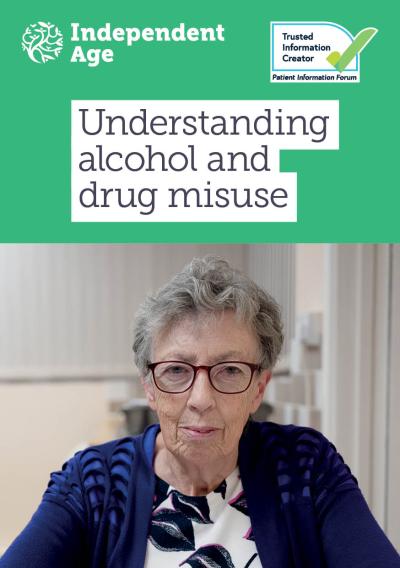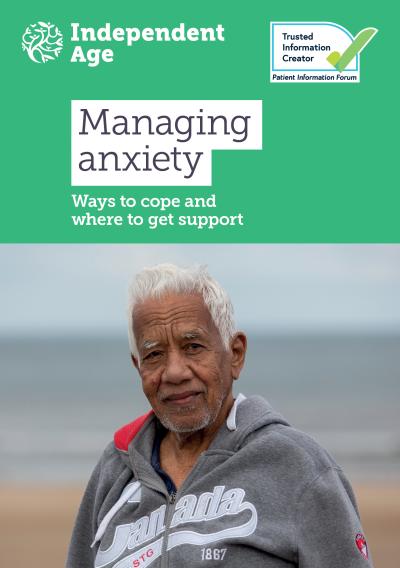Related publications

Understanding alcohol and drug misuse

Changes to our bodies in later life make us more sensitive to the effects of drugs and alcohol. This means that even moderate use can become a problem. Over time, this can have an impact on many areas of life. It may be hard to admit that you have a problem, but there are many ways you can get help.
When we drink or take drugs in a way that is harmful to us, this is called misuse. All kinds of alcohol and drug misuse can be harmful. The drugs that older people most commonly misuse are alcohol, prescribed painkillers, and medication for anxiety and sleep problems. Alcohol is the most common.
Many of us like to have a drink sometimes or use recreational drugs, such as cannabis or cocaine. This might be something you’ve done once or twice, or something you do regularly. You might also need to take lots of medication. But when you use these substances in a way that causes harm, it can affect your mental or physical health.
There are many reasons why we might misuse alcohol or drugs. Some people turn to them to help them cope with difficult times, such as the life changes that may come with old age – for example, bereavement, retirement, ill health or mobility problems.
If you’re lonely and isolated, you may use alcohol or drugs to help you deal with boredom or depression. You may use them if you can’t sleep well or you’re in pain. You might lose track of how your medication should be taken.
Drug and alcohol misuse is often a hidden problem for older people. You might feel ashamed and reluctant to ask for help. You may not be aware that there’s a problem. If you’re not meeting other people, it can go unnoticed.
It can also be missed by health professionals, who may assume your problem is the result of another health issue, such depression or dementia.
It’s important to be aware of the risks of drinking alcohol or taking illegal, prescription or over-the-counter drugs.
Government guidelines suggest that we shouldn’t regularly drink more than 14 units of alcohol per week. This is the same for men and women. However, even these amounts may be too much for older people. Ask your GP or other health professional for advice about safe drinking.
It can be difficult to work out how many units you’re drinking. It depends on the strength of the alcohol and the size of the glass, for example. Online calculators, such as the ones on Alcohol Change UK and Count 14, can help you work out whether you’re at risk.
You can find out more about prescription or over-the-counter medication on the electronic Medicines Compendium, or ask your pharmacist. Keep the written information that comes with your medication for future reference.
You can get detailed information about recreational drugs from the national drugs service FRANK.
If you’re worried, ask yourself the following:
If you answered yes to some of those questions, you may have a problem. See below for where you can get help.
Alcohol and drug misuse can harm your physical and mental health, cause difficulties in your daily life and affect the people around you.
The impact of drug and alcohol use varies from person to person.
Your physical health
You become more at risk of:
Your mental health
All drugs and alcohol have some effect on your mental health, changing your mood and the way you see things. The effects depend on what you’re using but could lead to:
You can find out more about the effects of alcohol on your physical and mental health on the NHS website. The national drugs service Frank has more information about the short- and long-term effects of specific drugs.
Start by talking to your GP, even if you’re just a little bit worried. Try to be honest about how much and how often you’re drinking or using drugs. If necessary, your GP can refer you for specialist assessment or treatment.
If you’re not comfortable talking to your GP, you can contact local treatment services yourself. You can find directories of drug treatment services on Frank and the NHS website.
For alcohol support services, visit NHS England or call Drinkline – a free, confidential helpline – on 0300 123 1110 or Drinkline Scotland on 0800 731 4314. For drug and alcohol services in Scotland and Wales, visit:
You could also contact support organisations such as Alcoholics Anonymous or Narcotics Anonymous.
Your treatment will depend on what you’re using and what you want to achieve. You might just want help to cut down or you may need to stop completely. If you’re referred to a local drug and alcohol treatment service, you should be given a keyworker who will make a care plan with you and see you on a regular basis.
Your treatment may include:
Private treatment is also available but can be expensive. You might be able to get a referral through the NHS.
Your GP should be able to help you if you’re struggling with pain. If you’ve become addicted to a prescription drug such as an opioid painkiller, you may need another way to deal with pain. Your GP may refer you to a pain clinic, where you could be offered a pain management programme.
You can also get information from organisations such as the British Pain Society or Pain Support, or organisations that deal with specific conditions. You could also try The Pain Toolkit.
It can be difficult to keep track of your medication, especially if you’re taking more than one. If you’re concerned about any medication you’re taking, speak to your GP or pharmacist. You may be able to get help to manage your medication, such as a Medicines Use Review.
Many people buy prescription medication online, but this can be dangerous. The medication may be of poor quality or unsuitable for you. The NHS website has advice on how to do this safely.
You can get worksheets and other useful resources to help you manage your drinking or drug use from some of the organisations listed in our guide Understanding alcohol and drug misuse.
Drug and alcohol dependency is a long-term condition and relapse is a common part of the recovery process. It’s understandable if you start misusing drugs or alcohol again after starting recovery. If you’re affected by relapse, you might want to seek ongoing support. Rehabilitation and recovery programmes can help you stay on track.
Try not to be hard on yourself if you have setbacks. You might find it helpful to attend meetings such as those run by UK Smart Recovery or Alcoholics Anonymous. See our guide Understanding alcohol and drug misuse for details of other support organisations.
Your friends and family may be able to help you find ways to keep busy that don’t involve alcohol or drugs. You could go back to a hobby or start a new one that helps to distract you.
If you’re concerned that someone you know might be misusing drugs or alcohol, try speaking to them and encourage them to get help. Be patient – it can take time for someone to admit they have a problem. Reassure them that they won’t be judged. See our page If you're worried about someone's mental health for general advice on helping somebody else.
Many people recover from drug or alcohol problems, but it can take a long time. If they have setbacks, encourage them to return to their recovery plan.
Living with someone who is misusing drugs or alcohol can be extremely stressful. You may feel worried and alone. Make sure you get support for yourself as well.
Some organisations have support groups or helplines specifically for families and carers affected by someone’s drinking or drug use, including Al-Anon family groups and DrugFAM, and in Scotland, Scottish Families Affected by Alcohol & Drugs.

For more information and details of support organisations, read our guide Understanding alcohol and drug misuse.
By calling Independent Age's free and impartial Helpline, you can get information and advice from one of our friendly advisers, or order our free guides.